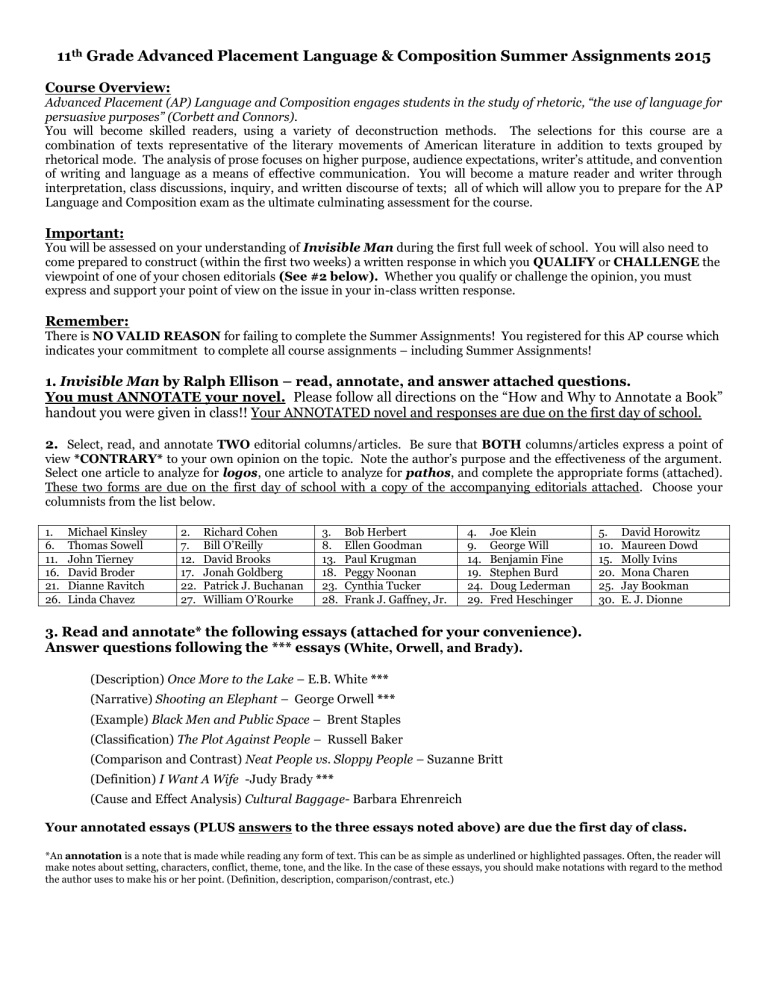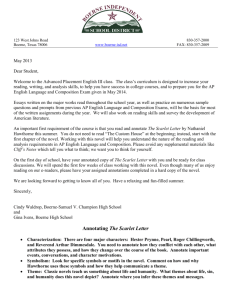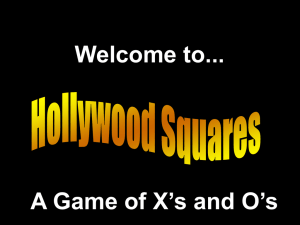11th Grade Advanced Placement Language & Composition Summer

11
th
Grade Advanced Placement Language & Composition Summer Assignments 2015
Course Overview:
Advanced Placement (AP) Language and Composition engages students in the study of rhetoric, “the use of language for persuasive purposes” (Corbett and Connors).
You will become skilled readers, using a variety of deconstruction methods. The selections for this course are a combination of texts representative of the literary movements of American literature in addition to texts grouped by rhetorical mode. The analysis of prose focuses on higher purpose, audience expectations, writer’s attitude, and convention of writing and language as a means of effective communication. You will become a mature reader and writer through interpretation, class discussions, inquiry, and written discourse of texts; all of which will allow you to prepare for the AP
Language and Composition exam as the ultimate culminating assessment for the course.
Important:
You will be assessed on your understanding of Invisible Man during the first full week of school. You will also need to come prepared to construct (within the first two weeks) a written response in which you QUALIFY or CHALLENGE the viewpoint of one of your chosen editorials (See #2 below). Whether you qualify or challenge the opinion, you must express and support your point of view on the issue in your in-class written response.
Remember:
There is NO VALID REASON for failing to complete the Summer Assignments! You registered for this AP course which indicates your commitment to complete all course assignments – including Summer Assignments!
1. Invisible Man by Ralph Ellison – read, annotate, and answer attached questions.
You must ANNOTATE your novel. Please follow all directions on the “How and Why to Annotate a Book” handout you were given in class!! Your ANNOTATED novel and responses are due on the first day of school.
2. Select, read, and annotate TWO editorial columns/articles. Be sure that BOTH columns/articles express a point of view *CONTRARY* to your own opinion on the topic. Note the author’s purpose and the effectiveness of the argument.
Select one article to analyze for logos, one article to analyze for pathos, and complete the appropriate forms (attached).
These two forms are due on the first day of school with a copy of the accompanying editorials attached. Choose your columnists from the list below.
1.
Michael Kinsley
6.
Thomas Sowell
11.
John Tierney
16.
David Broder
21.
Dianne Ravitch
26.
Linda Chavez
2.
Richard Cohen
7.
Bill O’Reilly
12.
David Brooks
17.
Jonah Goldberg
3.
8.
13.
18.
Bob Herbert
Ellen Goodman
Paul Krugman
Peggy Noonan
4.
9.
14.
19.
Joe Klein
George Will
Benjamin Fine
Stephen Burd
22.
Patrick J. Buchanan 23.
Cynthia Tucker
27.
William O’Rourke 28.
Frank J. Gaffney, Jr.
24.
29.
Doug Lederman
Fred Heschinger
5.
David Horowitz
10.
Maureen Dowd
15.
Molly Ivins
20.
Mona Charen
25.
Jay Bookman
30.
E. J. Dionne
3. Read and annotate* the following essays (attached for your convenience).
Answer questions following the *** essays (White, Orwell, and Brady).
(Description) Once More to the Lake – E.B. White ***
(Narrative) Shooting an Elephant – George Orwell ***
(Example) Black Men and Public Space – Brent Staples
(Classification) The Plot Against People – Russell Baker
(Comparison and Contrast) Neat People vs. Sloppy People – Suzanne Britt
(Definition) I Want A Wife -Judy Brady ***
(Cause and Effect Analysis) Cultural Baggage- Barbara Ehrenreich
Your annotated essays (PLUS answers to the three essays noted above) are due the first day of class.
*An annotation is a note that is made while reading any form of text. This can be as simple as underlined or highlighted passages. Often, the reader will make notes about setting, characters, conflict, theme, tone, and the like. In the case of these essays, you should make notations with regard to the method the author uses to make his or her point. (Definition, description, comparison/contrast, etc.)
Summer Reading Assignment – Due the FIRST Day of Class
Invisible Man by Ralph Ellison
ASSIGNMENTS LISTED BELOW & YOUR ANNOTATED NOVEL ARE DUE THE FIRST DAY OF CLASS.
1.
You must ANNOTATE your novel.
Please follow all directions on the “How and Why to Annotate a Book” handout you were given in class!!
2.
Write a two-paragraph analysis of EACH of the following:
(Theme) Racism as an Obstacle to Individual Identity
(Theme)
(Theme)
(Motif)
(Motif)
(Symbol)
(Symbol)
The Limitations of Ideology
The Danger of Fighting Stereotype with Stereotype
Blindness
Invisibility
The Sambo Doll and the Coin Bank
The Liberty Paints Plant
3.
Write a 3-paragraph response to ONE of the following questions:
1 . How does the division between how the narrator perceives himself and how others perceive him relate to the motifs of blindness and invisibility? Consider the role of racial stereotypes in the novel.
2 . How does the narrator’s briefcase encapsulate his history? Consider the contents of the briefcase. Consider also the dream that he has about the briefcase after the “battle royal.” How does the briefcase relate to the narrator’s position as a fugitive? What might the briefcase tell us about the narrator’s identity?
3 . What does the extended metaphor of dolls (the Sambo doll, for example) mean? What do they say about the power of racial stereotypes?
4 . What does the veteran mean when he tells the narrator, “Be your own father”? What is the role of fathers or father figures in the novel? Think about the narrator’s accusation that Jack wants to be the “great white father” and the description of the Founder’s statue.
5 . How does Ellison use irony to underline the difference between surface appearances and what lies beneath them? Consider Ellison’s literary treatment of Reverend Barbee as one example. What are other examples?
6 . What is the relationship between individual identity and community identity? Is it possible to remain true to both? Must the two always conflict? How does the narrator fail or succeed to assert his individuality amid communities such as the college, the Brotherhood, and Harlem?



